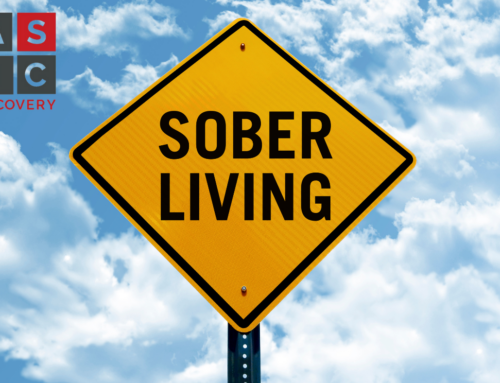On the surface, the idea of being sober might seem clear, but for many, what it means to be sober can vary. Unfortunately, it’s easy to view the disease of addiction, as well as the “addiction-recovery” world, in terms of black and white. If you take one sip of alcohol or take one hit off the crack pipe, you’re not sober. You’re either sober or you’re not.
Sober is about much more than just not drinking or not using drugs. Sobriety is a way of life. There is also a deeper type of sobriety once you’ve gotten free from the obsession to continue — emotional sobriety.
If you or someone you know has struggled to stay sober, you know that the disease of addiction creates a great deal of inner conflict. Maybe people, who otherwise wouldn’t do so, lie, cheat, and steal just to get the next mind-altering substance.
You may have called into work sick on numerous occasions in order to nurse a hangover or continue a drug or drinking binge. Addiction can become a demanding master for many. Sobriety is about getting freedom from this master.
Sobriety and recovery are available to every addict, no matter what walk of life they come from. All that is required is that the addict put a fraction of the effort into their recovery that they put into their addiction.
In this article, you’ll read about what it means to be sober and how sobriety (although it starts with abstinence) is so much more than just not picking up that first drink or drug.
Abstinence
When it comes to the disease of addiction, sobriety, in its simplest form, is abstinence. Therefore, the first step on the sobriety path is to stop using/drinking. This is no easy feat. In fact, depending on how long you’ve been in active addiction, it can appear to be quite impossible.
That’s because, more than most things, withdrawal can keep an addict actively using long past the point where they first tried to moderate or stop altogether. That’s why it’s recommended that you go to a residential treatment center for at least 30 days. At residential treatment, you’ll often receive medications that will help with the withdrawal symptoms.
In fact, some medications used to ease withdrawal symptoms (such as a Suboxone) can be used long after you get out of residential treatment for MAT (medication-assisted treatment). Medications used for MAT can help with strong urges to use (cravings or obsessions).
These mental urges can be quite powerful, particularly at the very beginning of your sobriety journey.
Once you’ve gone through a physical detox and have decided you are going to commit yourself to abstinence, your sober life truly begins.
Humility
Humility is a big part of what it means to be sober. If you want to achieve any long-lasting and meaningful sobriety, you will need to have an open mind and take suggestions well. If you start at a residential rehab facility, you will immediately start getting suggestions.
Some of these suggestions may include the following.
Attend an Intensive Outpatient Program (IOP)
After inpatient treatment, going to IOP is a logical next step. Many inpatient facilities will have an IOP. IOPs usually meet 3 days a week for 3 hours at a time.
One-on-one therapy and group counseling as usually an IOP’s main focus. You will also get random drug tests and will be asked how many recovery meetings you’re attending every week.
Go to Sober Living
Years of active addiction create unhealthy habits that aren’t going to disappear overnight. You will also hear that you need to change your people, places, and things if you truly want to get and stay sober.
Sober living can help you make these changes. There are many benefits of living in a sober house.
- You will meet people just like you who are starting their sobriety journey. Chances are that if they are there of their own volition, they serious about their sobriety.
- Random drug tests will be given to keep you accountable and ensure the safety of you and other members of the house.
- Regular attendance at recovery meetings such as SMART Recovery and 12-step meetings is highly encouraged and in some cases mandatory.
- By going to sober living, you’ll be giving yourself structure. Maintaining a schedule with good eating, work, and sleep habits are all integral parts of a healthy, sober lifestyle.
Go to Meetings and Get a Sponsor
One of the biggest suggestions you’ll get when you first get sober (and one you’ll continue to hear as you stay sober) is to go to meetings and get a sponsor/mentor. Active addiction involves a routine. Here’s an example of what an addict’s day might look like.
- Wake up feeling irritable.
- Find a way to get enough money to go buy drugs (more often than not, this can take all day). You may have to resort to stealing, depending on how bad your daily habit is.
- Get high or drunk
- Make sure you have enough money to get a motel room or stay in a shelter for the night. Once again this may take up the majority of an addict’s day.
- Get a little food if you have any money left
- Go to sleep knowing that you’ll have to do the same things all over again tomorrow.
When you start going to meetings, you’ll be getting into a much healthier routine. In 12-step fellowships, it’s highly recommended that you go to 90 meetings in 90 days.
This will help create more accountability for you, as regular meeting attendees will start expecting you to be there on a regular basis.
Making recovery friends and getting a sponsor (in 12-step meetings) are also highly suggested if you want quality sobriety. When you get a sponsor, your openness to taking suggestions will really be tested.
Giving suggestions is basically a sponsor’s job. Their job is to take you through the 12 steps and help you avoid any pitfalls and mistakes that they may have made along the way.
Reawaken Old Passions or Discover New Ones
Active addiction reduces your life to getting high or drunk and finding ways to continue getting high and drunk. It’s easy to lose sight of who you even are.
You may have once had big dreams that you were working towards, or maybe you started using drugs at such a young age that you never really found out what it is that you are passionate about.
Being sober is about finding things you are truly passionate about. Addicts get used to instant gratification. Pursuing and realizing your goals and dreams takes time. Leaning on other addicts in recovery who have been sober longer than you can help.
Finding something to do that you’re passionate about doesn’t mean that thing needs to become what you do to make a living. Maybe it’s something you do just for the sheer fun of it.
Helping Others
Along the same lines as finding your passion, helping other people can be a key part of a sober, happy, and fulfilling life. The disease of addiction is an extremely selfish condition. In active addiction, getting high and staying high is the theme for pretty much every day
Many people in the recovery community would agree that, if something isn’t done about an addict’s selfish attitude when they’re sober, they are likely to use or get drunk.
The great thing about fellowships is that their primary purpose is to carry the hopeful message of recovery to all those who are still suffering from the disease of addiction.
Live By Spiritual Principles
If being sober could be boiled down to one thing, it would probably be “living by spiritual principles.”
The life of an addict in the grip of their addiction is chaotic. Once again, the main driving force behind everyday life when you’re using is getting high and staying high.
Now that you’re sober, there need to be new driving forces behind your life — spiritual principles. Some of the spiritual principles of recovery have already been discussed. Here are some other ones.
Honesty
Dishonesty is a common trait among addicts. Lying to get money and lying about missing work/family engagements are extremely common.
Being sober is about being rigorously honest. Telling the truth when it doesn’t always benefit you can be challenging. You may even lie about little things that you don’t even realize you’re being dishonest about.
It may take months or years to gain the trust of your loved ones back; however, you need to make the effort every day. It can start with small things.
For example, if you are running late for an engagement, don’t blame it on traffic when the main reason you are late is that you didn’t leave soon enough.
Hope
Spiritual principles are things you can practice. Life in active addiction can begin to feel hopeless, especially towards the end. Now that you are sober, you can practice being hopeful.
Be thankful for another chance at life and try to remain optimistic.
Being hopeful will also have a positive impact on those around you, helping them to believe in themselves.
Faith
Having faith is a key component to happy sobriety. You start out by having faith in other addicts in recovery. You believe that what’s currently working for them can work for you too.
Then as you continue to practice spiritual principles in your everyday life, your faith will turn into trust.
Having faith in the recovery process will yield fantastic results. More than likely, your family and loved ones will start to notice the positive changes in your life (due to recovery) before you do.
Your experience will give them faith.
Courage
Getting sober takes a great deal of courage. It means facing life on life’s terms. It means letting go of negative coping skills to adopt new ones.
When we walk courageously in our sobriety, other addicts will notice, and it can help them to believe that they too have the courage to get and stay sober.
Integrity
In active addiction, addicts commonly say one thing and do another. In sobriety, you can show people that they can rely on you.
When you say you’re going to do something or be somewhere, you do it.
Willingness
Willingness is the key that opens the door to sobriety. Willingness matches up well with other spiritual principles.
For example, when you have faith that what another addict is doing is helping their recovery, you get the willingness to try it out, even if you aren’t sure it will help you.
Patience and Perserverance
Sobriety takes patience and perseverance. Sober life isn’t always going to be “rainbows and butterflies.” There are difficult times ahead. Sometimes, you may feel like you aren’t making any progress. You may even relapse and find it hard to get back on track.
Remember to be gentle with yourself. A lifetime of addiction can’t be undone overnight. What does it really mean to be sober? It means doing the right thing when no one’s looking, but it also means doing the right thing whether you want to or not.
There are going to be times in your recovery journey when you don’t feel like going to your meetings. Some days, you’ll wish you hadn’t committed to taking a meeting into an inpatient facility so you can stay home and watch the big game.
In fact, there will be days when you’ll wish you weren’t an addict. You’ll wish that you didn’t have to do recovery stuff at all. It’s during these times that you need to turn to gratitude. Make a list of all the great things a sober life has given you that your addiction tried to steal away.
Recovery is a marathon, not a race. Be patient and persevere; and like they say “Don’t quit before the miracle happens!”
IOP at ASIC Recovery
Looking for substance abuse treatment in Texas? At ASIC Recovery, our Intensive Outpatient Program (IOP) is dedicated to helping individuals develop healthier coping skills and build a supportive recovery network. Click to learn more.



